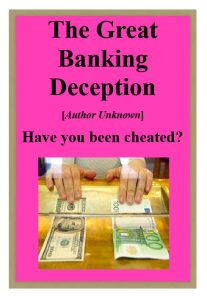Have you been cheated?
In order for any contract to be valid, there must be ‘full disclosure’, ‘good faith’, ‘valuable consideration’, and ‘clean hands’. Here is what the banks advertise: “Come to our bank. We have money to loan you”. Is this really what happens?
Did you really get a loan when you contracted to borrow money from the bank to pay for your home? Or was it just an exchange (your note for cash), but the bank called it a loan? Or did two loans occur?
When you entered into a loan contract with a bank, you signed a note or contract promising to pay the bank back, and you agreed to provide collateral that the bank could seize if you did not repay the loan. This contract supposedly qualified you to receive the bank’s money. But did the bank provide ‘full disclosure’ of all of the terms of this agreement? Read the following and decide for yourself if the bank was acting in ‘good faith’, that you received ‘valuable consideration’, and that your ‘signature’ on that agreement is valid.
Bankers want you to believe that depositors deposit money at banks, banks lend the money to borrowers and the borrowers repay the money and the money is returned to the depositors who funded the loan. If you think this is how American or Canadian banking works, you have been lied to and deceived.
The fact is the economics of today’s banking system is similar to stealing, counterfeiting and swindling and that is why the bankers cannot explain the loan details or answer specific questions. Bankers are terrified that the details might be exposed in public court.
